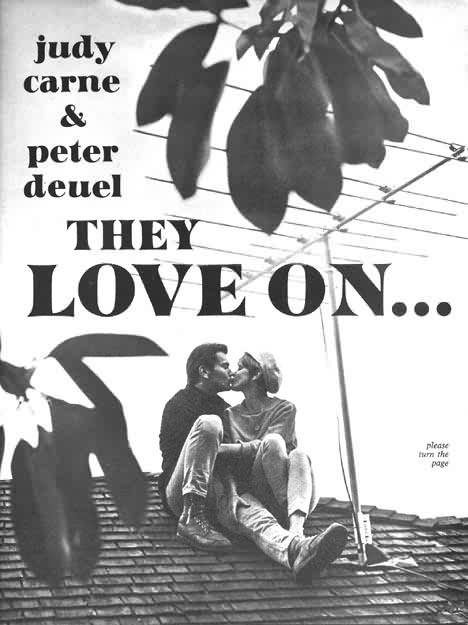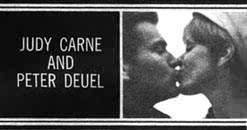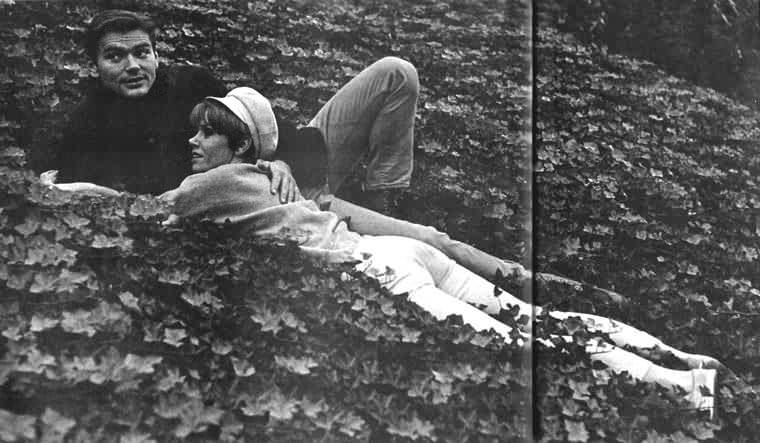 Judy still feels the sting of tears as she recalls
her life with Burt Reynolds, and remembers how hopeful she was
that he wouldn't take her seriously that day she uttered the
awful words, "I want a divorce."
Judy still feels the sting of tears as she recalls
her life with Burt Reynolds, and remembers how hopeful she was
that he wouldn't take her seriously that day she uttered the
awful words, "I want a divorce."
 Judy still feels the sting of tears as she recalls
her life with Burt Reynolds, and remembers how hopeful she was
that he wouldn't take her seriously that day she uttered the
awful words, "I want a divorce."
Judy still feels the sting of tears as she recalls
her life with Burt Reynolds, and remembers how hopeful she was
that he wouldn't take her seriously that day she uttered the
awful words, "I want a divorce."
Even today, sometimes in the script of "Love on a Rooftop" she has some lines that remind her of Burt, of her life with him, and how they were both struggling to find success. Only, when she acts them out loud, it's not for the benefit of Burt, it's for Peter Deuel, the husband she now has to take Burt's place even if it's not for real.
It might still be a little early for Judy Carne to think of anyone taking Burt's place, but if there was ever another man to pick up the shattered pieces and put them back together again, it's Peter. He's married to her on the screen, and knows that the Judy Gillis [sic] who is his art student wife in "Love on a Rooftop" also has a lot of Judy Carne in her personality.
And he digs it--which is just fine with Judy, who at last is beginning to feel again--to warm up to those people around her she likes and can trust.
It's difficult enough to go through with a divorce when you're still in love, but it's even more difficult to lose your heart again afterwards. After her divorce from Burt in 1965, following two years of marriage, Judy played it very cool on the love circuit. She was apprehensive about any new relationships or involvements, and besides, she had a rough time getting over the memory of her marriage to Burt--and the way it busted up.
But Peter came along as her struggling young architect husband in a new television series that ultimately turned out to be a hit. That meant they'd spend a lot of time working together, getting to know each other's hang-ups and idiosyncrasies--in fact, just getting to know each other.
And like each other. For Judy anyway, she finally discovered she had a chance to be herself with Peter. She didn't have to impress him because he dug her as she was, even when nerves and tensions sometimes gave way to a short circuit temper.
On the contrary, Judy, forgetting her own problems, decided that Peter needed taking, under her wing. After their first meeting, when she realized that he was even newer to the business of television than she was, she set out to help him avoid pitfalls and problems, to see that he was taken care of, and generally let him know he had someone around the place who cared. She found herself warming up to Peter, who needed her help, and, what's more, genuinely liking and trusting him. There was never any awkwardness in their relationship, never any holding back.
 "Pete's
a true love," says Judy in admiration of her TV co-star.
"Once, when he lost his temper, he even threatened to belt
me one. And he could be right. Maybe what I need is a good knock
on the head."
"Pete's
a true love," says Judy in admiration of her TV co-star.
"Once, when he lost his temper, he even threatened to belt
me one. And he could be right. Maybe what I need is a good knock
on the head."
Judy wouldn't say that of just anyone, but she knows and likes Peter well enough to feel that he understands her, understands what she's been through.
And he does. "Judy's all woman with a big extra--she has compassion underneath," is his glowing opinion of the pert Britisher. "I don't think the series could have happened without her. She's straight forward and coldly honest with herself. Sometimes we fight all day on the set, but we always make up before we go home."
And now that Judy has put her trust in a man once again--in decidedly eligible Peter Deuel, she finds that their friendship doesn't necessarily have to be confined only to the set of Love on a Rooftop. By nature, she is a very warm and outgoing person, who's the life of any gathering and is, indeed, at her best when she's surrounded by people. But after she and Burt split it took a long time to pick up the lost threads of her personal life, threads that she cut in her loneliness and misery.
Even devoting her time to Peter, he in turn helped her get back on her feet again. Not only did he enjoy working with his kicky British "wife," but he also enjoyed helping her find a way of life again. Realizing her need for people, and knowing that she had to get out of the doldrums which were a hangover from her divorce, Peter made it his full-time job to reactivate the old Judy, to bring out the joy and love of life he knew was buried somewhere within.
And he succeeded in making Judy see that as well as being considered just a good friend, he is a man who has feelings too, who is capable of falling in love---even with his co-star. And Judy would be hard not to love.
Now it's very much easier for Judy to return his feelings. Her divorce from Burt Reynolds is behind her, and so are the early days in Hollywood, when she discovered that talent wasn't the only commodity necessary in helping her career.
Secure now, with a hit series behind and in front of her, Judy is happy those days are over. With her big eyes flashing in indignation, she snapped, "A girl becomes prey in Hollywood--just because she is in the position of needing work. I've had some nasty, unpleasant experiences with producers--the whole bit like the casting couch routine and the chasing around the table."
Her mouth made a moue of distaste, as the pint-sized pixie with the peck-sized British accent went on to recall some of those unpleasant moments. "Listen," she continued, "I've had them lay it right on the line with me, and bluntly too. But I have my own moral code, and I'm not about to change it for the sake of a job."
Then, with a wry chuckle, Britain's latest gift to U.S. television added, "Sometimes it worked, and they'd turn right around and head in the other direction. They'd dig me because I was so honest. But other times," she shrugged philosophically, "I lost the jobs. But so what? You have to live with yourself."
Judy's background had not prepared her at all for the old casting couch ploy, despite the fact that she has been a professional entertainer since she was 16 years old.
"I never wanted to be anything else but a performer," she admits candidly. "First I wanted to be a dancer--a prima ballerina like Margot Fonteyn. So my parents, with great good sense, enrolled me in the famed Bush David Theatrical Boarding School in Sussex, England, where the discipline and training were simply fantastic."
Her face suddenly assumed a painful wince, as Judy said, "I'll say the discipline was stern. I had a Russian ballet trainer who was so tough that if you put one foot wrong, you got a whip wrapped around your ankle. I had blood running from my feet from it. But that is real ballet training; it's what it really should be.
"Oh, I ran away a few times," she grinned, "but since I never had any money, I never got further than the railway station. Then after I made friends and adjusted to the routine, I loved it. I was a show-off kid, anyway and when we put on the shows for parents once a year, I shone. I was really in my element."
With a gamin grin and a quick movement to demonstrate her willingness to perform on the spot, Judy said, "I was a real Shirley Temple when I was a kid–sang and danced all the time. I can still do a good impersonation of her--a really good one."
But Shirley Temple, whose greatest fame came as a child star, never faced any of the problems Judy Carne had to cope with in Hollywood--right from the beginning when she first came to the United States as a regular cast member of the short-lived television series, Fair Exchange.
"They glorified the whole deal," Judy says, a slight note of irritation still in her voice, "by telling me I'd be earning so much money and doing this and that. You see," she continued, "in the series, one family was English, and the producers came to London to cast them. I was just one of two hundred who read for the girl's part originally. Then they kept eliminating people and more people, until, finally, it was down to me. At that time, a few years ago, coming to Hollywood was a whole lot bigger deal than it is today. I got all kinds of publicity when I was leaving. You know: English girl makes Hollywood.
"Great," Judy said bitingly, "until too late my father discovered that what sounded like a huge salary in England is really nothing in this country. And, because we English actors didn't know or understand about the currency problems, they had four of us working for about the price of one American actor. Then we understood why they'd cast the whole thing in London."
For a moment, Judy's eyes snapped as if ready to catch fire, as she said, "So I had a whole year on that show, earning a joke salary . . . just a joke. But it was all right," she finished casually, "because it gave me a chance to get settled, and I wanted to stay."
Smiling puckishly at the look of surprise on the face of this reporter, Judy repeated, "Yes---I wanted to stay, despite everything. Somehow, I just loved it immediately. I still love it and I wouldn't want to live anywhere else.
"Oh, I still go back home every year, or my folks come here," she said. "I went back two Christmases ago, and my parents visited me here last October. We try to alternate it that way, but of course, sometimes, it doesn't work out."
Her eyes grew even larger than their normally big, wide gaze as Judy continued with ingenuous innocence, "But I don't like the glamour bit."
Then she paused before saying strongly,
"That's not quite correct. The truth is, I just hate it.
I hate going to the 'in' places. I hate doing the ‘in', things,
and I hate being forced to spend time with people I don't enjoy.
They bore me.
"I hate these so-called 'right connections,' too," she
stated tartly. "I never do anything to cultivate them. I
just feel that if I can't make it on merit with all the training
and experience I've had, I'll never do it."
Judy's first professional appearance, right from school, was in a successful London revue, For Amusement Only. She recalls it with zestful pleasure. "It ran for two years, and was fantastic training for me, because they kept changing the program all the time," she remembers gratefully.
"You see, it was like some of the
shows you've seen here, in which the entire Establishment is lampooned,"
Judy explained. "They make fun of just everyone in a position
of authority. The people think it's hysterical, and flock to see
the shows.
"The English are notorious for making fun of themselves,"
she said. "They're good at it, and accept it better than
I think Americans do. I can't imagine anyone in this country staging
a show putting down the President, but in England, everyone thinks
it's funny. It is, too," Judy said, with that elfin look
of mischief darting forth once more.
After her first show, and some appearances on the British version of Juke Box Jury, Judy got her first big break in a musical, Chrysanthemum. Her spritely performance in this show brought her to the attention of the producers of My Fair Lady, who were looking for a replacement in London for Julia Andrews. Judy won the role with only one interview, and remained with the show until it closed. She also made an English film, A Pair of Briefs.
Then came her first ill-starred venture
in Hollywood, Fair Exchange. After that, she was cast in
The Baileys of Balboa, which didn't last any longer than
the first show.
That's when Judy started making the rounds--and encountering some
of those Hollywood wolves for real. None of which troubles were
helped at all by the failure of her marriage to Burt Reynolds
(currently starring in Lassiter following his ill-fated
Hawk series) and their subsequent divorce.
"It's more difficult, I think," Judy says, "to be a single girl in Hollywood than anywhere else. Simply because, as I said, we're prey. A girl applying for a job in a drug store in Wichita, Kansas, won't run into the same thing. She'll either get the job or she won't, but whichever, it will be on merit.
"Of course," Judy concedes, "it's getting better over here. Old-time Hollywood was worse. Then, some girl having an affair with a producer would be in every picture he made, come what may. Now, that's dying out a bit, thank God, and they're beginning to judge people more by their work, by their skills.
"But a little of it still exists," the pert girl insists, "and I've had two or three very unpleasant experiences. Also," Judy added sadly, "a lot of people want to use you. I'm not big enough yet to be used very much, but in a small way people take advantage of me.
"For instance," she said, "everyone thinks if you're doing a television series, you have to be a millionaire. That is not true at all, but if you walk into a shop, and they know who you are, they'll try to take you."
This is a problem Judy is having to face more and more these days, for her third series, Love on a Rooftop, has broken the jinx that haunted her heretofore. She is fast becoming one of the most popular--and recognizable--young stars in the country.
And she's learning, by her own admission. "I used to be completely unaware of people trying to use me," she says of herself. "I was an idiot with a pen. I signed anything, thinking other people were looking after my welfare---and ended up in court three times. So," she said resignedly, "you live and learn. You can't trust everybody, and you have to be extremely careful. Some people, it seems, need to be taken, but not me. I resent it, and when I detect it, I run as far as I can get. A masochist and a sufferer I'm not."
Nor does Judy's determination to win work on merit alone stop with acting roles and producers' offices. It extends to publicity, too, where, when approached on the prospect of posing nude for, say, a Playboy spread, she exploded with, "Dear Lord, no! And not because I'm a prude, either--I'm anything but.
"Look," she adds hastily, "if all those girls want to do it, that's okay with me. But as far as I'm concerned, I don't have that kind of image; I'm not a 'sex' symbol. And, besides," she finished with a fine flash of fire, "I don't need to show my bare body to make a living."
No one could argue that. For Judy Carne
has proved beyond a doubt that a bright British lass, from a sheltered,
traditional family life, can come to Hollywood, fight adversity
and win on merit alone. And win, furthermore, a personal battle
with love, marriage and divorce--as long as she has people like
Peter Deuel to help.
Photo Caption: Following
the heartbreak of her divorce from Burt Reynolds, Judy had a rough
time picking up the pieces, but Peter Deuel, her co-star in"Love
on a Rooftop," helped her. Now Judy and the bachelor are
the best of pals.

Photo Caption: Sometimes, Judy and Peter have big fights on the set, but when the day's shooting is over, they make up and forget about them. In fact, they spend a lot of time together when they're not working, and Peter says Judy's great.